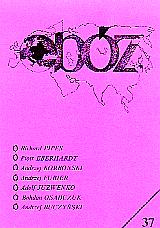Obóz 37 (2001)
Z Katalog.Czasopism.pl
Przejdź do Obóz lub Spisy treści 2001
ANALIZY
Richard Pipes
Europejskość Rosji
Piotr Eberhardt
Wiek XX. Przemiany narodowościowe w Europie Środkowo - Wschodniej
Andrzej Korboński
Polityka Stanów Zjednoczonych wobec Związku Sowieckiego i Rosji od 1980 r. do chwili obecnej
Andrzej Furier
Niepodległość krajów zakaukaskich po rozpadzie ZSRR
DEBATY
Adolf Juzwenko, Bohdan Osadczuk
Polska - Ukraina: wspólne wartości, wspólne dziedzictwo, wspólne konflikty
Z PRAC STUDIÓW WSCHODNICH UW
Andrzej Buczyński
Polityka reintegracji w stosunkach rosyjsko - białoruskich
IN MEMORIAM
Andrzej Werner
Aleksandras Shtromas (4 IV 1931 -12 IV 1999)
Richard Pipes
The Europeannes of Russia
For Russians, it is obvious that Russia belongs to Europe, though for Europeans from the West this is not the case. To make his point, the author analyzes not only that country&39;s cultural achievements, but also its societal structure and institutions. He does this because Russia&39;s European cultural heritage, which includes the works of Tchaikovskii or Mussorgsky, does not sufllce to prove that Russia is in fact European. The most important institutions that determined Europe&39;s historical evolution are private property and individual freedom, which are institutions that clearly distinguish Russia from Europe.
Piotr Eberhardt
The Twentieth Century: Changes in East Central Europe&39;s Ethnic Composition
This article describes the changes that have taken place over the last century in the ethnic composition of the geographic area lying between Russia and Germany, and between the Baltic, Adriatic, and Black Seas. The main trends have been outlined, as well as their causes. The main source for this research has been general censuses. The author struggled with the problem of the changing international borders. To overcome this problem, the author examined the smallest possible units included in the census, and then linked them to comprise the areas included in today&39;s political units.
Andrzej Korboński
U.S. Policy Toward the Soviet Union and Russia from 1980 until the Present
This article outlines U.S. policy toward the USSR and post-communist Russia from 1980 until the present. Reagan&39;s election as U.S. president is taken as the starting point, a president whose term in office saw an unprecedented turn-over in communist party General Secretaries in the USSR, as well as an economic crisis in that country. Gorbachev&39;s coming to office marked the beginning of efforts to improve relations with the United States, but also the beginning of the end of the Soviet empire. Only with the Clinton presidency did there appear to be some new
international order coming into place. The fact that there were divergent tendencies within American politics meant that this development was significantly later than it might have been. The final failures at reform in Russia forced there to be a change in relations between the two countries.
Andrzej Furier
Post-Soviet Independence in the States of the Transcaucasus
The current political map of the Caucasus was shaped to a large extent by the events of the last two centuries, a period when the region fell under Russian rule. In the social consciousness of Armenians, Azeris, and Georgians, however, a sense of their own identity survived, which was the catalyst for building the newly independent national states. The first years of independence were filled with difficulties and conflicts, with a clear lack of any new political elite. This brought about a return to the former ruling class and to the Russian political sphere of influence.
Adolf Juzwenko, Bohdan Osadczuk
Poland- Ukraine: Shared Values, Shared Heritage, Shared Conflicts
In the past, discussions about Poland and Ukraine&39;s relations as neighbors would usually bring more grief than joy, especially during the period when both Poles and Ukrainians found themselves the objects of various powers&39; ambitions. They pursued their own interests by pitting one nation against another. When an opportunity would arise, attempts were made, albeit with difficulty, to overcome mutual prejudices, but these usually ended in failure. Nevertheless, both discussants express hope for the future.
Andrzej Buczyński
Reintegration Policies in Russo-Belarusian Relations
This article discusses the process of reintegrating the Russian Federation and the Republic of Belarus that has been taking place sińce the collapse of the USSR in up until the present. It also reviews the attempts that have been made to link the two countries institutionally. From the broad formulation „The Commonwealth of Independent States,” which soon proved to be only a transitional relationship with the former great power, to the new organizations created as the result of current the current political situation, such as the Customs Union, the Association of Russian and Belarus, and the Union of the Republic of Belarus and Russia. Also discussed in the article are other initiatives, which despite having been taken up many times in the relationship have never been carried out. New version: This is a description of how relations between Moscow and Mińsk have developed during the years 1991-1999 in the context of the new regional political situation in the „post-Soviet space” of the C.I.S. The status of relations between these two states -which maintain economic imbalances and peculiarities as a result of the declared.
